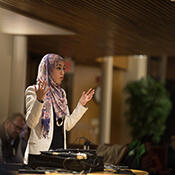 Technological advances have affected Muslims no less than the rest of the world. There are now Muslim talk radio shows, television shows that tell specifically Islamic stories, and online editions of the Qur’an and Hadith.
Technological advances have affected Muslims no less than the rest of the world. There are now Muslim talk radio shows, television shows that tell specifically Islamic stories, and online editions of the Qur’an and Hadith.
Communication is particularly important for the growing Muslim community in the United States, both as a way to build organizations and as a way of presenting a clear alternative to negative images of Islam in the wider American media. Many Muslims were using various media outlets to engage with fellow Muslims and to teach non-Muslims about Islam long before the events of September 11th, 2001 when Islam and Muslims were thrown suddenly into the spotlight.
American Muslim organizations have for decades published newspapers like Muslim Journal, founded in 1960 by Nation of Islam leader Elijah Muhammad under the title Muhammad Speaks, or magazines, such as the Islamic Society of North America (ISNA)’s Islamic Horizons. Muslim Sunrise (or Moslem Sunrise, as the earlier version was called) claims to be the oldest Muslim publication in the U.S., founded in 1921 by the first Ahmadiyya missionary to the U.S., Dr. Mufti Muhammad Sadiq.
Technology has enabled instant access to and presentation of information by anyone and to anyone throughout the world, changing the media landscape considerably. It is now possible, even common, for voices from across the globe to participate in discussions about the construction of a Muslim community center in lower Manhattan or in Murfreesboro, TN for example. Some community leaders and organizations regularly use social media like Facebook, Twitter, and blogs, inviting online discussions with fans and followers. Louis Farrakhan, leader of the Nation of Islam since 1978, has over 300,000 of followers on Twitter. Imam Suhaib Webb hosts a popular website with the slogan “your virtual mosque.” The site includes resources such as a glossary of Islamic terms, audio and video clips, advice columns, and op-ed pieces.
In 2004, Radio Islam became Chicago’s first daily Muslim talk show, broadcasting recitations of verses from the Qur’an and discussions of current events. The Islamic Information Service of Southern California, part of the Islamic Center of Southern California (ICSC), broadcasts its weekly program, Islam, to more than 100 cities across the United States and keeps a regularly updated archive of weekly khutbas (sermons at Friday prayer) and bi-weekly podcasts.
Searchable texts and databases of the Qur’an and hadith in Arabic and English translation are readily available online and as Smartphone apps. Similarly, there are interactive online tools and applications for the calculation of prayer times or for learning how to recite the Qur’an.
While the depiction of human forms, especially of the Prophet Muhammad, is considered by many Muslims to be forbidden, some are using visual forms to teach concepts about Islam and to address issues facing Muslims in the West today. The 99 is a comic book and television series created by Kuwaiti Dr. Naif Al-Mutawa and published in the Middle East in 2006 and the United States in 2007 by Teshkeel Comics. “The 99” are teenagers, each of whom has a power inspired by one of the 99 attributes of Allah. Al-Mutawa, who received the World Economic Forum’s 2009 Social Entrepreneur of the Year award for The 99, says one of his goals in creating the comic was to “rebrand Islam” following 9/11.
Of course, just as no single individual represents the views of all Christians or Hindus, Muslims voices in the media also vary widely. Not all Muslims in the world or even in America would be in agreement as to how American Muslims should live their lives. Yet the discussions that have been occurring in American Muslim communities for decades are now being held in a more public forum. With crowdsourced sites like Reddit and Wikipedia, anyone with access to the internet can be an active contributor to the discourses on Islam in America. What it means to be an American Muslim in the 21st century is a living discussion that is taking place first and foremost through, and as a result of, the media.